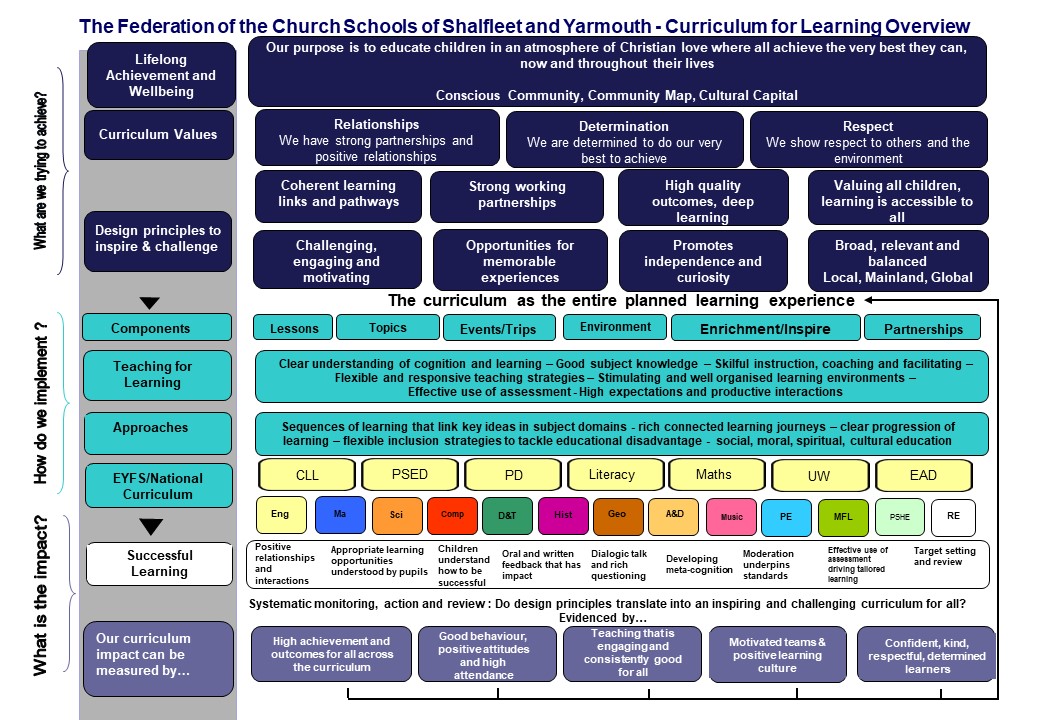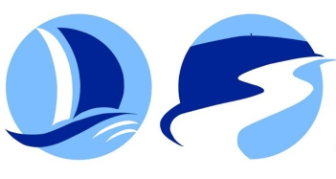An inspiring curriculum here at the Federated Schools of Shalfleet and Freshwater & Yarmouth
CURRICULUMIntroduction
At the Federated Schools of Shalfleet and Freshwater & Yarmouth Primary, we provide the children with a broad and balanced curriculum. We take into account the locality in which we live, ensuring that the curriculum is enriched through the environment, outdoor learning and our local communities. We firmly believe that developing the characteristics for good learning should underpin academic progress.
We are very aware that living on an island children could become isolated and not have a broad understanding of the wider world. Therefore, we arrange many experiences for the children to visit the mainland – this means that the children will have left the Island at least 7 times before they leave Primary School. We also organise many Federated events, including a residential where the children integrate with their friends from our Federated schools, developing in confidence and resilience.
Our curriculum topics are varied, taking into account the interests of the children which is instrumental in ensuring children engage with their learning. We also ensure that our teachers have taught a topic which is inspiring for them. We believe that teaching something you are passionate about inspires passion in others and a thirst for learning. The topics are underpinned by the school Christian Values of Respect, Resilience and Relationships which run as a thread through everything that we do.
‘Inspire Days’ provide the children with some out of the box learning experiences. Inspire Days along with other specific events enable us to invite parents, governors and the local community into the school to share the learning and support the children to progress.
The schools celebrate its student voice through the Junior Leadership Team and the Learning Leaders.
We hope that this information has provided you with an insight into how we strive to inspire and enrich the children’s learning within our Federated schools.

Our Federation Learning Principles
1. Coherent learning links and pathways
Children’s learning is a coherent experience, taking a holistic approach, incorporating outdoor experiences where possible. There is a detailed curriculum map with clear links between different areas of learning that build upon previous knowledge.
The federation offers a range of whole school topics, such as looking at our Island and all that it has to offer, the wider world and considering global and current affairs.
2. Strong working partnerships
We develop and sustain strong working partnerships across the school, the federation, the local community and further afield focused on providing a good education to all children where all stakeholders feel valued.
Opportunities are built in for shared trips and events across the federation, facilitating opportunities to share skills and knowledge, building in links with the local community as well as links with schools on the mainland. We invite people in to share their expertise through Inspire Talks and sporting events.
3. High quality outcomes, deep learning
At every stage across the federation, children achieve their very best in all areas, with opportunities for accelerated progress for all. Members of staff have high expectations for all learners.
There are opportunities for children and young people to develop their full capacity for different types of thinking and learning, exploring and achieving more advanced levels of understanding. Children take ownership of their own learning by making choices of what they would like to learn and engage in exciting and relevant topics. We use high quality texts and experiences that engage and motivate.
4. Valuing all children, learning is accessible to all
The learning planned for children and young people responds to their individual needs and support their particular needs, aptitudes and talents. It provides opportunities for exercising responsible personal choice, celebrating all successes across the curriculum. Ensuring that learning stretches as well as supports, that it is adaptable; drawing on the experiences, outside learning and working together where possible. All pupils complete meaningful tasks that come from their interests, designed to build resilience and independence.
5. Challenging, engaging and motivating
The federation is committed to offering a curriculum that embeds learning and has high expectations for all children at its core. There is an ethos of a growth mind-set, where mistakes are celebrated and encouraged as learning opportunities. Wherever possible learning themes and topics come from the children, making learning topical and based on current affairs. Beginning in the EYFS, practice is flexible and relatable, learning is steeped in practical activities and problem solving opportunities. This hands on approach continues right through the school, taking in outside learning opportunities where possible. Topics link to rich texts, the local community and further afield to develop our learners into resilient, knowledgeable world citizens. Staff have the opportunity to specialise in areas of expertise and share their skills across the federation.
6. Opportunities for memorable experiences
We offer a variety of experiences that give children genuine, lifelong memories. We involve the children in planning their own experiences where possible to ensure there is an authentic child voice. We involve parents, the community and have opportunities for visitors across the arts, sciences and sports as often as is possible and relevant. Throughout the year, there are Inspire Talks and Risk Days to open the children to new experiences and ideas. In classes, there is consistently good teaching and time to build relationships with key adults in school, for example the ELSAs. The church forms a significant part of the children’s school life experience with key visits to the local church as well as church groups and representatives regularly visiting school. As an island school, we celebrate what the Isle of Wight has to offer with a range of trips, as well as looking further afield and ensuring all children have the opportunity every year to ‘get off the rock’ and experience new and diverse opportunities.
7. Promotes independence and curiosity
Beginning in the EYFS, we give opportunities to children to take ownership of their learning. Finding out how they learn as well as what they have learnt in order to personalise their experiences. From the beginning of their time in school, children learn about a growth mind-set, thus developing resilience, and their awareness of the self and others. We encouraging open tasks where the children are able to choose their own level of challenge. Elected JLT and Learning Leaders give the children ownership of choices made in the school by representing options to the Senior Leadership Team and Governors and being involved in the writing of policies.
8. Broad, relevant and balanced - Local, Mainland, Global
There is a clear and coherent curriculum, covering all areas of the EYFS and National Curriculum. Linking topics across the curriculum where possible, linked to high quality texts and current affairs as well as significant periods in history. Topics will look at influential people alive today and through history, the environment and has an emphasis on topical issues such as climate change.
Organisation
At the Federation we recognise the importance of learning that is both meaningful and memorable. We know that it is essential to make connections between different subjects and to link learning, so that children see a purpose for the learning that they will carry with them throughout their lives. As a result, the ‘Learning Led Curriculum’ is planned, enabling links between subjects around a central theme. We focus upon developing four key skills:
• Working together • Improving own learning and performance • Creative thinking and problem solving • Enquiring mindsThis way of working encourages ownership and develops children’s independence. It is an exciting and challenging way of learning and one that all our children (and teachers) enjoy.
Some aspects of the curriculum are taught discretely. These include mathematics, the ‘basics’ of literacy [spelling, phonics, handwriting] and subject areas such as PE. Other curriculum areas such as ICT, French and music have elements of subject area that are taught discretely but are also incorporated into topic led areas of learning.
